
Yes, Mexico grants birthright citizenship (jus soli) to anyone born on its territory, regardless of their parents’ nationality.
It also recognizes citizenship by descent (jus sanguinis) for children of Mexican parents abroad, with dual nationality rights since 1998.
But what does this mean for you? The answer depends on your situation:
- U.S.-born children of Mexican parents. You can claim Mexican nationality through descent, even if your parents never registered you.
- Adults reclaiming family heritage. Many people denied or misinformed by consulates still qualify.
- Parents registering their U.S.-born kids. Early registration saves future legal complications.
- Spouses of Mexican citizens. Marriage opens a path to residency and later citizenship.
- Families fixing documents for eligibility. Errors or missing records do not erase your right to nationality.
We’ve helped thousands of families in California, Texas, Illinois, and beyond secure their rightful Mexican citizenship, all without consulate visits.
If you are curious about how birthright citizenship works in practice, from passports to property rights, keep reading.
Below, we will break down exactly what it means, why it matters, and how you can take the next step with confidence.
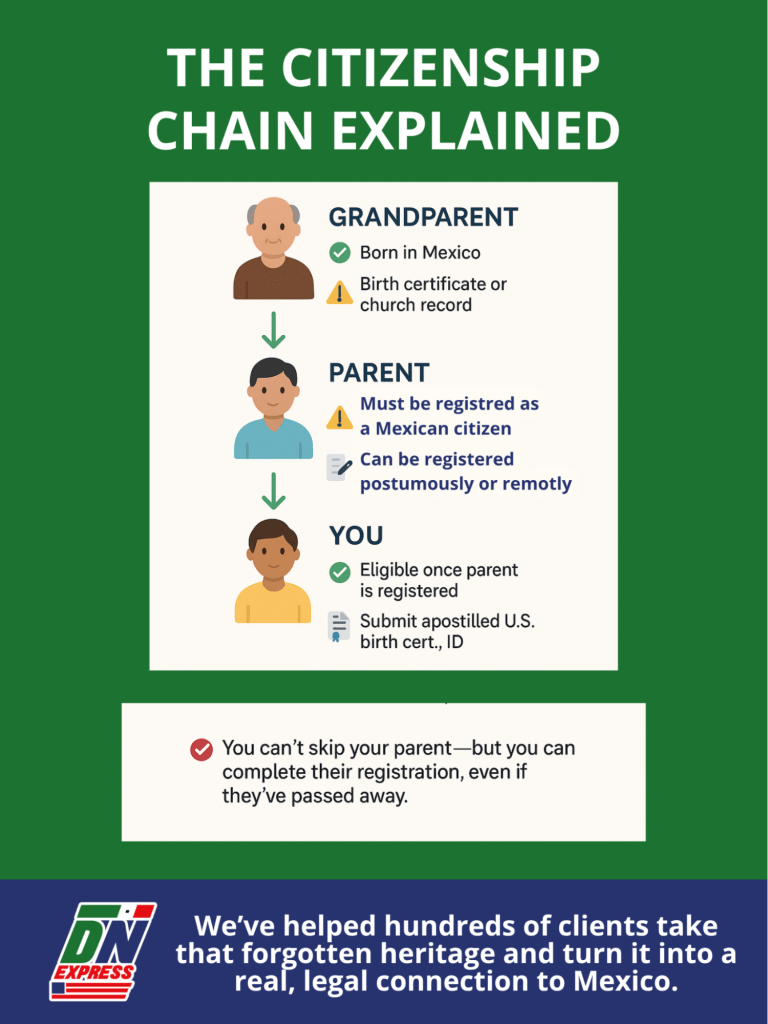
What Exactly Is Birthright Citizenship in Mexico?
In Mexico, birthright citizenship works under jus soli. This means that if you were born on Mexican soil, you are Mexican by birth, no matter the nationality or immigration status of your parents.
This rule is established in the Constitution of Mexico and makes the country one of the few with unrestricted birthright citizenship, similar to the United States.
Mexico also recognizes citizenship by descent (jus sanguinis). If at least one of your parents is Mexican, even if you were born abroad, you have a right to claim Mexican nationality.
This applies equally to children of Mexican mothers and fathers, thanks to constitutional reforms that guarantee gender equality in the transmission of nationality.
There are only two main exceptions:
- Foundlings (children with unknown parentage) are considered Mexicans if discovered in the country.
- Children of foreign diplomats born in Mexico do not receive Mexican nationality at birth, since their parents are under diplomatic immunity.
One of the most frequent worries we hear is: “If my parents are American and I was born in Mexico, am I Mexican?”
The answer is yes. You are a Mexican citizen by birth.
However, you will need to secure your documents (such as your Mexican birth certificate, CURP, and passport) to exercise your rights. That is where professional help can make the process faster and easier.
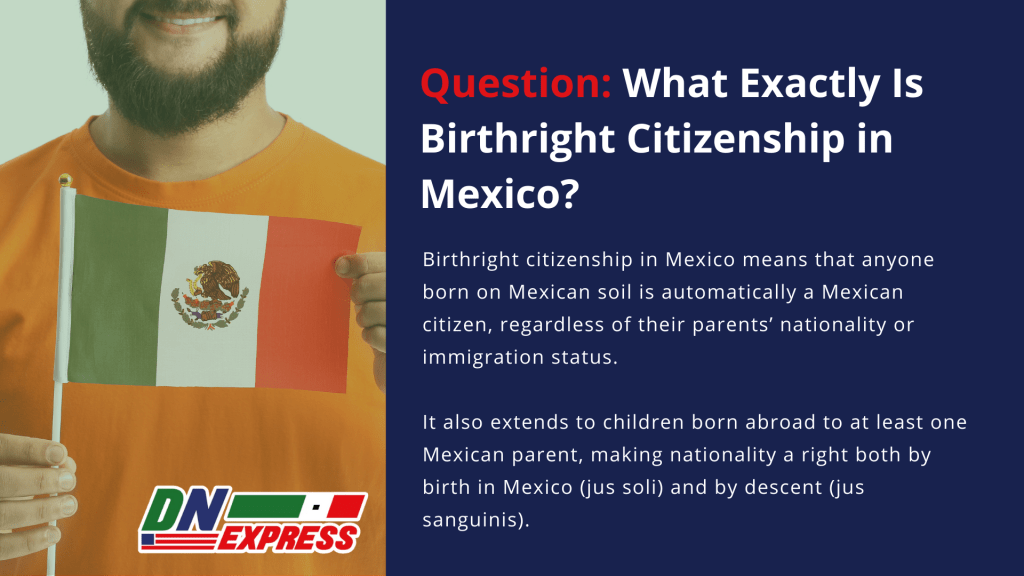
Why Is Birthright Citizenship So Significant?
For many families, birthright citizenship is a cornerstone of identity, opportunity, and belonging.
Here is why it matters so much:
1. Legal Identity and Rights
Becoming recognized as a Mexican citizen gives you the ability to:
- Obtain a Mexican passport for international travel.
- Vote in national and local elections.
- Own property anywhere in Mexico without restrictions.
- Access public benefits and protections reserved for citizens.
2. Emotional and Cultural Roots
Citizenship is not just paperwork; it is a way to reconnect with your family’s history. For U.S.-born children of Mexican parents, reclaiming nationality often feels like preserving a legacy and keeping cultural traditions alive for the next generation, a sentiment reflected in demographic studies by institutions like the Pew Research Center.
3. Practical Advantages
Holding dual nationality can make daily life smoother and more affordable:
- Healthcare access in Mexico’s public and private systems.
- Education opportunities at national universities with reduced tuition.
- Inheritance rights that simplify passing down property and assets.
- Travel flexibility within Latin America and beyond.
4. Real-World Examples
Birthright citizenship can even shape professional opportunities. Pro athletes such as Julián Araujo, Efraín Álvarez, and Jonathan Gómez chose to represent Mexico internationally by exercising their dual nationality. This is proof that citizenship can open doors you did not even know existed.
Whether your goal is to secure your rights, protect your family, or simply honor your roots, birthright citizenship gives you options that last a lifetime.
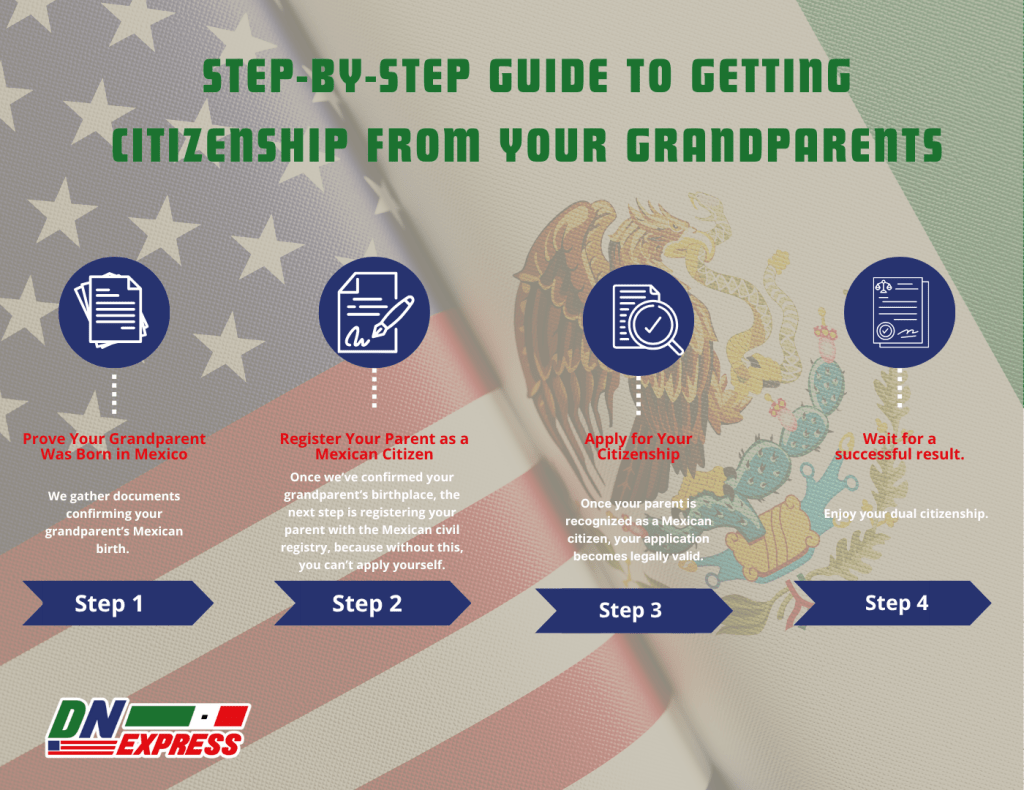
Challenges & Worries
Even though Mexico’s rules on birthright citizenship are straightforward, the paperwork process often feels anything but simple.
Many families run into the same roadblocks, but most of these problems have solutions.
“The consulate told me no, does that mean I can’t apply?”
Not at all. Most denials happen because of clerical errors, mismatched names, or missing paperwork, not because you are ineligible. With the right legal approach, these cases are completely fixable.
“I don’t have my parent’s Mexican documents.”
This is a common obstacle, especially for U.S.-born adults reclaiming heritage. The good news? Our team can locate and recover records directly in Mexico, even if they have been lost for decades.
“Do I need to speak Spanish or live in Mexico?”
No. Language skills and residency are not requirements for claiming citizenship. Your eligibility is based on law, not lifestyle.
“Do I have to wait months for a consulate appointment?”
Not with our firm. Our team processes cases without requiring consulate visits, saving families the frustration of endless waitlists.
These worries are normal, but they should not stop you from securing what is rightfully yours. With experienced legal guidance, birthright citizenship is far more accessible than most people realize.
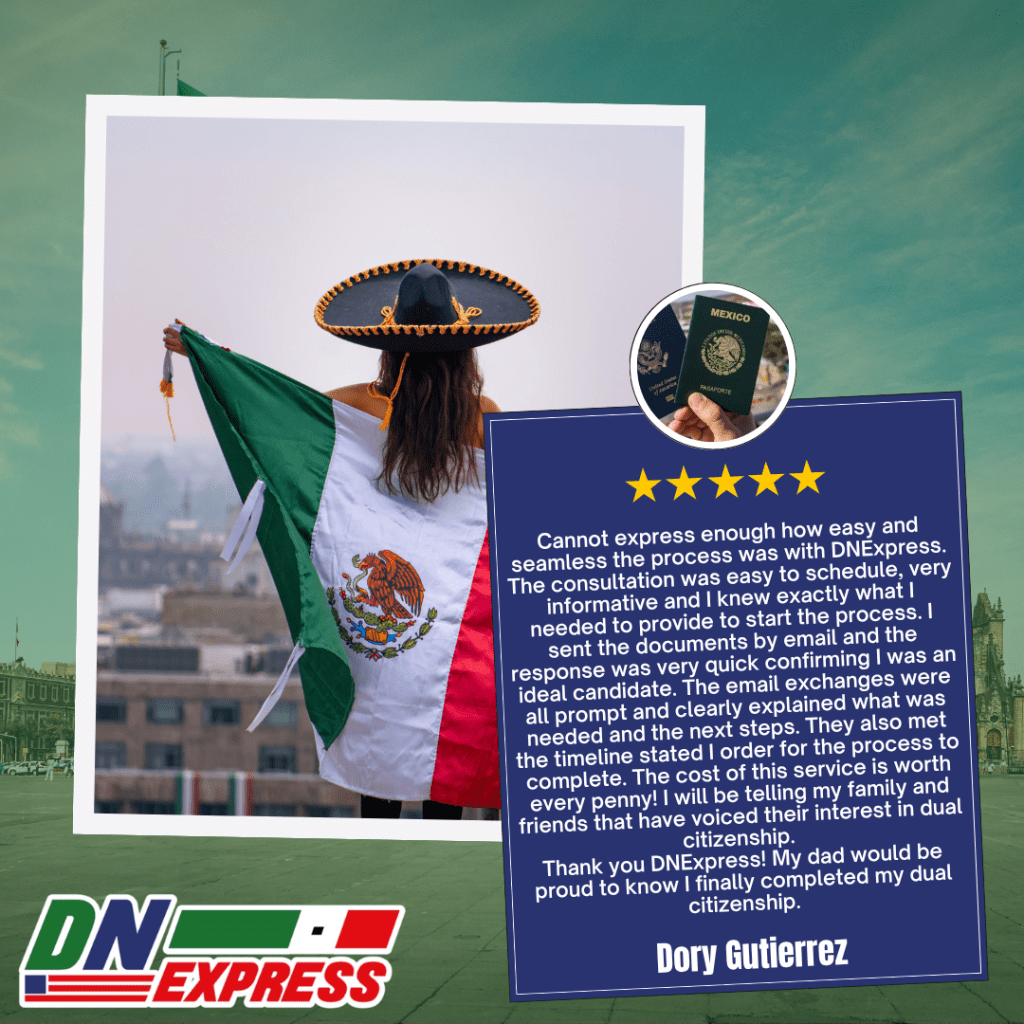
Why Work With DNExpress Instead of Doing It Yourself
Many people start the process on their own, only to get stuck in endless delays and rejections. Here is why:
DIY Pitfalls
❌ Missing documents = rejection. Even small errors or mismatched names on an apostilled document can derail your application.
❌ Consulate waitlists. Appointments can take months to secure, often with no guarantee of approval.
❌ Travel expenses. Retrieving documents in Mexico can mean costly trips and wasted time.
❌ Risk of mistakes. Fixing errors on birth certificates or dual registrations requires legal expertise; one wrong step can make things worse.
DNExpress Advantages
🇲🇽 No consulate visit required. We handle everything remotely.
📜 Licensed Mexican attorneys guide your case, not just processors or middlemen.
💻 30+ bilingual agents available by phone, email, and WhatsApp for real-time support.
🗺️ In-country record searches across all 32 Mexican states to locate missing documents.
💲 Affordable, transparent pricing with flexible payment plans.
⚖️ Specialists in “impossible” cases, from rejected applications to double birth certificates.
With our legal team, what feels overwhelming on your own becomes simple, legal, and fast.
Take the Next Step Today
Don’t let misinformation, lost documents, or consulate delays block your right to Mexican nationality.
📞 Call DNExpress today to Schedule a Free Case Review with our licensed attorneys.
💬 Prefer text? You can also message us on WhatsApp or securely send your documents online to get started from anywhere in the U.S. or abroad.
Your Mexican citizenship is your right. Let’s make it official, quickly and stress-free.
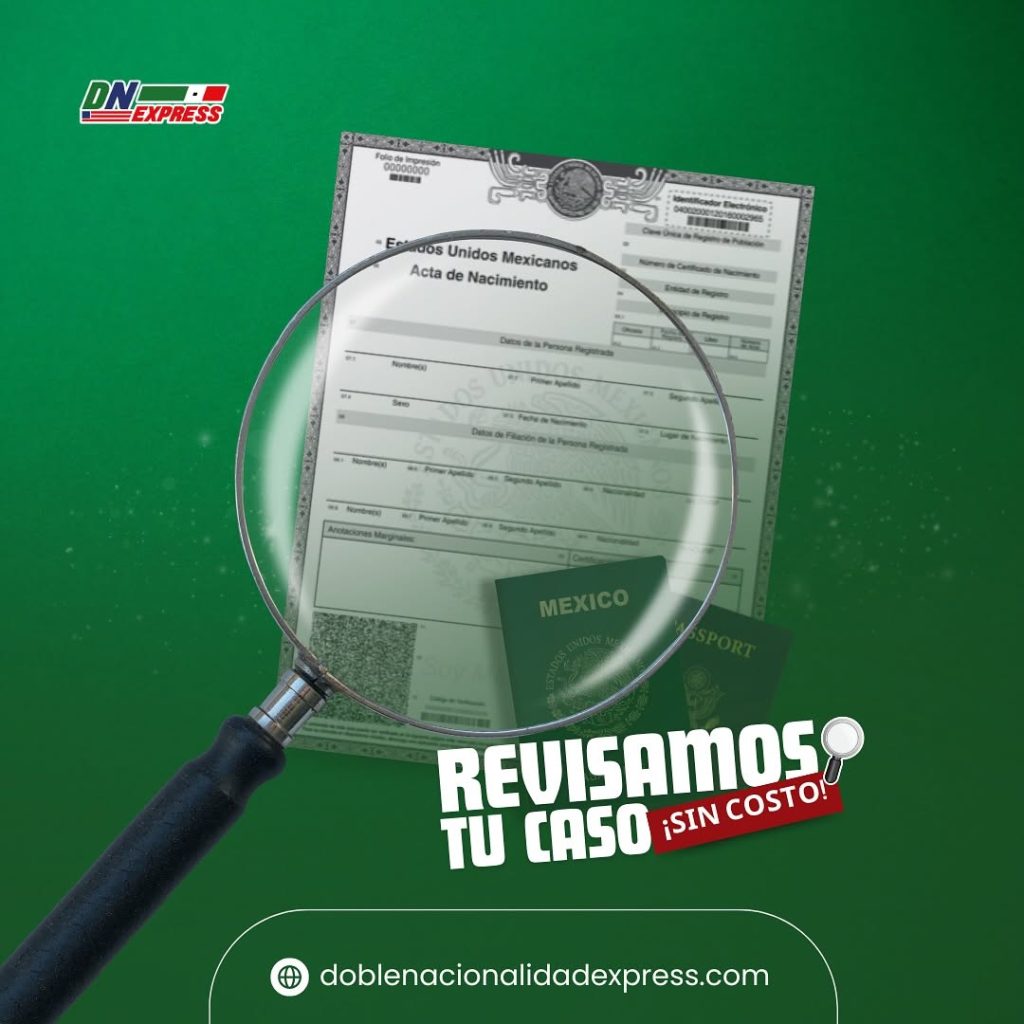
FAQs People Actually Ask About Mexican Birthright Citizenship
We hear the same practical questions every day from clients and community forums. Here are the most common, with clear, lawyer-backed answers from our FAQ page:
Do you get citizenship if you give birth in Mexico?
Yes. Any child born on Mexican soil is automatically Mexican by birth, regardless of the parents’ immigration status or nationality.
Does a child born in Mexico also get U.S. citizenship?
Not automatically. A child only receives U.S. citizenship if at least one parent is a U.S. citizen and meets the residency requirements for transmitting citizenship abroad.
How many citizenships does Mexico allow?
Mexico has recognized dual and multiple citizenships since 1998. You can hold Mexican nationality alongside U.S. or other citizenships without penalty, as confirmed by Mexico's Secretaría de Relaciones Exteriores.
Do Mexican birth certificates expire?
No. A birth certificate never expires. However, for legal processes in Mexico, you may be asked to present a recently certified copy (usually issued within the past year).
How strong is the Mexican passport?
The Mexican passport ranks in the top tier globally, offering visa-free or visa-on-arrival access to over 150 countries, including much of Latin America, Europe, and Asia.
What are the rights of a Mexican citizen?
Mexican citizens can:
- Vote in elections at all levels.
- Own property anywhere in Mexico (foreigners face restrictions near coasts and borders).
- Access public healthcare and education.
- Move freely, live, and work in Mexico without immigration paperwork.
- Receive consular protection abroad.



